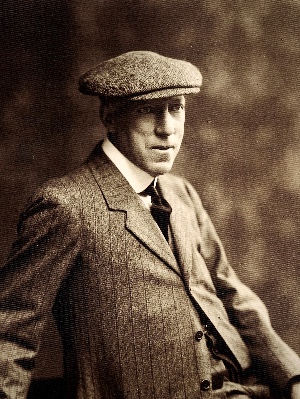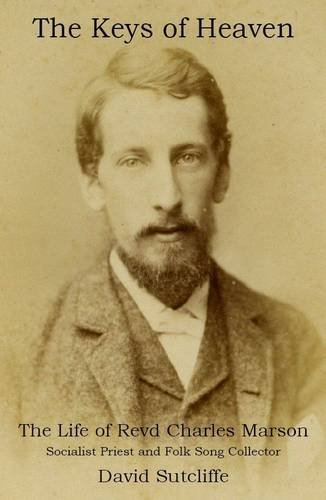Sharp, Constance
Also known as: Connie
Singer
Collection date:
Area: London
Constance Sharp (c1862-1928): Cecil Sharp’s wife Constance (known as Connie) always supported Cecil in his folk project, even though he was away from his family for weeks at a time. Two things must be remembered, however – first, those were different times when gender roles were more restrictive; secondly he was actually at home throughout term times, living in the Hampstead Conservatoire until 1905 and bicycling the 8 miles to Ludgrove School (Barnet) twice a week 1893-1910, so he would actually have seen his four children most evenings.
Connie helped Cecil materially by transcribing 180 songs (lyrics) from field notebooks to his fair copy books – specifically FW87 to FW307; and FW467-479. Her handwriting is consistently smaller than Cecil’s with marked differences in style*. Another small service that Connie did for Cecil was to supply him with the tune for 'As I sat on a sunny bank' (aka I saw three ships: Roud 700), which was published in Sharp's 'English Folk Carols' book in Dec 1911 (version one). In Folk Tunes 2708 Cecil simply says 'Sung to me by CDS (i.e. his wife Constance Dorothea Sharp) as sung by Charles Poole of Sinwell, Wotton-under-Edge in 1882'. See separate profile of Charles Poole. It's unlikely that Cecil received and preserved this tune over the space of 30 years, but more likely that Connie had kept the tune among her papers and dug out the tune in Oct 1911 just at the time Cecil was working hard on the new carols book. https://archives.vwml.org/records/CJS2/10/2708
Connie was born c1862 in West Alvington nr Kingsbridge, Devon as Constance Dorothea Birch, 3rd of 5 children of Priestley Birch, gentleman and his wife Dora (née Hoghton). Priestley Birch was the son of Lea Birch, a cotton spinner and merchant of Manchester, who retired to Devon in the 1860s. Dora Hoghton (pronounced Horton) was the 4th child of Sir Henry Bold-Hoghton, 8th Baronet of Hoghton Tower, a fortified manor house midway between Preston and Blackburn, Lancashire. Her brothers Henry and then Charles became 9th and 10th Baronet respectively. Money and prestige then passed through her stepmother’s line to the 14th Baronet today.
Priestley and Dora were married in 1857 and might have anticipated a very comfortable life but Priestley died aged 38 in 1867, when Constance was just 5, and a year later her grandfather Lea Birch also died. Dora’s father had died in 1862 and suddenly sources of income dried up. Dora lived modestly enough as a widow for the next 35 years. She moved the family around - Lyme Regis in 1871 census, Hastings in 1881, Wotton-under-Edge in 1882, Clevedon in 1891 and Headington in 1901. It was at her house Sandfield Cottage, Headington, where Sharp had his first contact with morris dancing in 1899.
In the mid-1870s the Birch family were living at Weston-super-Mare, which is where Connie first met Cecil Sharp. He had left Uppingham School in 1874 and was sent for mathematics coaching to Mr George Heppel’s private school at Highfield house at Weston. Heppel (1830-1908) was the son of a fruiterer in the City of London and obviously acquired a great arithmetical facility. He went to St John’s College Cambridge and would later become Vice-President of the Mathematical Association. He had a large and young family when Sharp arrived for a two-year stay with him. There were just 3 other students. To one of his musical evenings Heppel invited Dora Birch and family including Connie, then aged perhaps 13 or 14; Cecil would have been 15 or 16.
In his biography of Sharp, Fox Strangways portrayed Connie as ‘a tall and beautiful girl with brown, wavy hair, and, behind some unfortunate glasses, brown eyes: she could sketch successfully, sing, and play the violin’. Sharp went off to Cambridge University and then to Adelaide, South Australia for several years, from where he wrote to Mrs Heppel** in 1887 that he had become engaged to a Miss Ida Canning. That didn’t work out and he got back in touch with his childhood sweetheart Connie upon his return to England and they were married on 22/8/1893 at All Saints, Clevedon, the Rev Charles Marson officiating.
The couple’s prospects weren’t wonderful - he was 33, she was 31. Cecil had some part-time school teaching plus private music lessons. But in 1896 he was appointed Principal of the Hampstead Conservatoire*** (two and a half days a week) on an initial salary of £100 a year and a house to live in. To this Connie brought her own allowance of (approximately) £100 a year. This put them in the middle-middle-class bracket – lower white collar jobs began at £100 a year (teachers, clerks), while upper middle class positions started at £750+. Cecil lost the Hampstead Conservatoire job in July 1905 and resigned from Ludgrove School in July 1910. He was, however, awarded a Civil List pension of £100 in July 1911. With Connie’s allowance raised to £148 and this new pension, their declared income (incl other teaching, lectures and books) at April 1912 was £615****.
In 1899 on a visit to Connie’s younger brother Walter Birch, an estate agent in Walton-le-Dale nr Preston, Sharp first heard Mattie Kay singing in a local concert. She was only 17 but Sharp was so impressed with her voice that he arranged for her to go down to London to receive training at the Hampstead Conservatoire (see her profile). Mattie stayed with the Sharp family and she later wrote: ‘Mrs Sharp (was) splendid, treated me exactly like one of the children’ (CJS1/12/11/1/1 p1).
Connie had 4 children – Dorothea (b1894), Charles (b1896), Joan (b1898) and Susannah (b1902). Her son Charles was wounded in the First World War and spent a long time in recovery at Highgate Hospital in 1917 – Cecil was in America at the time and Connie no doubt bore the worry and strain. She herself had already been ill with heart trouble following an attack of scarlet fever in 1915 and was described as a ‘semi-invalid’ for the rest of her life. She was ill again in Sept 1920, requiring an operation.
None of Connie’s daughters married, so she had no grandchildren through them. But her son Charles, who emigrated to Malaya to work for the Rubber Research Institute in Kuala Lumpur, had 2 children – Briony and Richard. After Cecil’s death in 1924, she stayed on at their home 4 Maresfield Gardens, Hampstead and died there on 4/1/1928.

